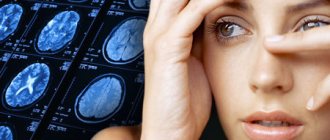SUCH people cause themselves and those around them a lot of worries, because even a banal runny nose of “imaginary patients” can not only unsettle, but also lead to a nervous breakdown of everyone who is within a radius of several meters. Let's remember the hero of Moliere's immortal play "The Imaginary Invalid" named Argan - in the end he was exposed, but how much blood he drank from his household!
But for medical companies that produce dietary supplements from various parts of the body of exotic animals, bracelets made from dubious metal alloys and similar products, hypochondriacs are a guarantee of a comfortable existence. What to do about it?
The floor goes to our expert, psychotherapist Elena Suslova .
Signs of nosophobia
Nosophobia – what kind of phobia is it? Nosophobia is the fear of getting sick. An alternative name is pathophobia. The fear of one specific disease is more common, for example, cancerophobia (fear of cancer). Fear of all diseases is less common; it is usually associated with mysophobia (fear of germs, bacteria).
Subtypes of nosophobia:
- fear of contracting an incurable disease;
- fear of cancer;
- fear of getting tuberculosis;
- fear of developing a mental disorder;
- Cardiophobia (heart disease);
- fear of getting HIV;
- venerophobia (fear of sexually transmitted infections);
- fear of hereditary diseases;
- fear of skin diseases.
The behavior of a nosophobe has distinctive features:
- frequent medical examinations;
- increased cleanliness;
- avoiding sick people;
- passion for medical literature, articles from the Internet;
- avoidance of public places;
- increased attention to your well-being;
- careful selection of clothing according to the weather;
- self-diagnosis and self-medication.
If the patient thinks that he has dressed too lightly, if someone is coughing next to him, then he may have a panic attack. Nosophobia is frightened by visiting hospitals and donating blood (it seems that he will be infected with something).
The development of symptoms occurs in several stages:
- Slight anxiety due to thoughts of possible infection.
- Suspicion of the presence of diseases, depression, melancholy, fictitious symptoms.
- Obsessive thoughts about the presence of illness or about surrounding dangers.
- Obsessive thoughts become obsessive actions. The patient tries in every way to protect himself and self-medicates. Uses folk and (or) traditional medicine.
Somatic symptoms include the following:
- arrhythmia;
- tachycardia;
- feeling of suffocation;
- feeling of a lump in the throat;
- hypertension;
- shiver;
- sweating;
- chills;
- headache;
- nausea;
- stool disorder;
- dizziness;
- frequent trips to the toilet.
The more somatic symptoms are observed, the more a person is convinced that he has some kind of disease. Weakness or fatigue is perceived as a sign of serious pathology. But in fact, this may be a natural and temporary deterioration in well-being due to overwork.
Favorable results of a medical examination do not reassure a nosophobe. He is sure that the doctors overlooked something or do not want to tell the terrible truth. He goes to another clinic or self-medicates.
Nosophobia is often confused with hypochondria. These disorders are really similar; they belong to the same group of anxiety-phobic disorders. The difference is that with hypochondria the anxious component is more pronounced, and with nosophobia the phobic component is more pronounced. How else is the fear of getting sick different from hypochondria?
- with nosophobia, panic attacks occur;
- A nosophobe is often afraid of only one disease.
Hypochondriacs are afraid of all diseases; after excluding one pathology, they find symptoms of another. The distinction between disorders is important only with a full psychiatric diagnosis; in everyday life, nosophobia is identified with hypochondriacal syndrome.
This is interesting! Not all nosophobes are keen on going to hospitals and undergoing examinations. Some patients, on the contrary, avoid any contact with doctors because they are afraid to find out about the disease.
Normal or mental disorder
Fear of the dark - what is this phobia called, why does fear arise and how to fight it
To find out what the fear of illness is, you need to compare the categories: is it normal or a mental disorder. From this perspective, phobia is often called hypochondria, since they have very similar syndromes. This is wrong, since hypochondria is a mental disorder due to suspicion of various diseases, and nosophobia has a component inherent in any phobia: frequent attacks of unreasonable panic about a specific disease. This greatly influences the manifestation of pathology.
Frequent attacks of unreasonable panic about a non-existent illness make the course of the phobia severe
Simply put, a hypochondriac begins to suspect that he has all the illnesses at once, including the illness that he read about on the Internet or overheard in the clinic. Nosophobe invents a specific illness for himself, in severe cases of the disorder coming to the conclusion that he has threatening symptoms. Experts who study this phobia note that many people suffer from it. It can create discomfort in life, as it deprives a person of physical and emotional strength.
Important! Psychologists advise the relatives of a nosophobe to convey to him how harmful and severe such a pathology is. First of all, the person himself faces problems. He begins to be tormented by vain fears, worsening the condition of the nervous system and leading himself to a serious disorder. In addition, loved ones also suffer, as they are forced to constantly listen to the complaints of a nosophobe and endure his depression and panic.
Causes of phobia
Why are people afraid of getting sick?
- Memories of suffering a serious illness or watching someone else become ill. Pain, loss of mobility, lengthy and complex or expensive treatment, forced care for someone, dependence on someone - all this can affect a person’s condition for a long time. The consequences will be even worse if a person witnesses someone's death due to illness.
- Personal negative experience of receiving medical services. An incorrect diagnosis or erroneous treatment that aggravates the course of the disease can forever deprive one of confidence in doctors. Therefore, pathophobes do not believe the diagnostic results and the opinions of doctors.
- Fear of death. According to psychoanalysis, disease phobia may be a variant of thanatophobia. The psyche focuses on one of the possible sources of death - illness, fatal infections.
- Need for attention. Children who, from childhood, are accustomed to receiving care, love, and attention only in moments of illness, grow up to be adults with hypochondriacal syndrome.
- Hyperprotection in the family. Anxious parents, for reasons of care and safety, intimidate the child and teach them to be too attentive to their health. As a result, the child grows up weak, dependent, and suspicious.
- Suggestibility, suspiciousness, developed imagination. Impressionable people tend to make up symptoms. Advertising stories make them perceive the human body as vulnerable and weak. If such a person imagines the course of any disease, hears a colorful description of the pathology, then he can feel the real symptoms (psychosomatics).
The risk group includes self-centered individuals prone to manipulation. An illness, even if far-fetched, can be a way to influence loved ones: to cause a feeling of guilt, to receive some kind of benefit, to gain attention.
It is important! Fear of illness may not be an independent disease, but a symptom of other disorders. For example, depression, schizophrenia, OCD. Before starting treatment, you need to undergo a differentiated diagnosis from a psychotherapist. Based on its results, the specialist will draw up a treatment program and tell you how to overcome the fear of disease.
Effective ways to combat suspiciousness
An important step is to recognize the problem, which will allow you to return to normal life without worrying about the little things. Any feelings of danger or imaginary illnesses should not be considered as a reason for self-diagnosis. Such patients should stop looking for diseases in reference books. Creative activities will also help you get out of the situation, this could be embroidery, drawing, modeling, cooking. The listed activities will help get rid of bad thoughts, but will also contribute to the development of creative abilities.
Expanding your social circle also plays an important role. Lonely people often suffer from hypochondria and try to attract attention to themselves in this way. In such a situation, it is recommended to enroll in literary courses, go on a trip, and play sports. Animal grooming may be an alternative to consider. The support of loved ones is also important; they need to be told about everything that worries them.
How to get rid of the fear of diseases
Fear of getting sick is highly treatable. The emphasis is on psychotherapeutic work. Drug treatment is rarely prescribed, as this can aggravate the nosophobe’s condition.
Psychological help
The first meetings are the most difficult. The psychologist will have to earn the trust of the nosophobe. Several sessions are spent building collaborative, trusting relationships. After this, you can begin cognitive behavioral psychotherapy. The specialist and the client reproduce frightening situations; under the supervision of a psychologist, the patient is immersed in them. For example, if a client is afraid of poisoning, germs, bacteria, then he is asked to put his hands in the dirt. The psychologist teaches methods of self-control, the patient learns to cope with his anxiety.
What other methods help overcome fear for your health:
- Paradoxical intention. For half an hour to an hour, the patient deliberately fantasizes and imagines the worst possible development of events. This helps to get rid of obsessive fear, realize its irrationality, and cope with anxiety in a critical situation.
- Stopping thoughts. Every time a person catches himself in the negative, he says “stop” and switches his attention to something positive.
- Visualization. The patient imagines his fear and anxious thoughts in the form of some image, for example, a piece of sugar, and then imagines how this sugar dissolves in a glass of water.
- Hypnosis. The client is put into a trance state, the hypnologist finds a negative attitude and instills a new belief.
Independent work on fear
Obsessive thoughts and frightening images are the result of the imagination. Why don't you guide him in the right direction and overcome his fear of disease with his own weapon.
How to get rid of the phobia of fear of getting sick:
- focus on signs of healing, improvement in well-being;
- imagine how your body is cleansed, cells are restored;
- imagine how your blood is saturated with oxygen.
Eat right, exercise, and learn to feel the positive changes in your body. Make it a habit to take a walk every day before bed. Before lights out, remind yourself of the benefits of sleep, proper nutrition, sports, and walks. Praise yourself for maintaining a healthy lifestyle. Thank your body for the fact that it can heal itself and recover during sleep.
How else to deal with a phobia:
- Breathing exercises. When you feel the physical symptoms of panic overtaking you, do a simple exercise. Take a deep breath, hold your breath for two seconds, then exhale sharply. Repeat several times.
- Relaxation through tension. To calm panic, tense your entire body and hold your breath, then suddenly relax. Repeat several times.
- Internal dialogue. Talk to yourself for five minutes. Talk about what emotions you are experiencing. Think about how manifestations of fear and your actions look from the outside. Think about what you can tell yourself to calm down.
It is important! The work of healing must begin with the admission “I am afraid of getting sick.” Mindfulness significantly speeds up recovery and improves prognosis. “Yes, I am afraid of diseases, but how justified is my fear?” is the first question you need to ask yourself.
Reduced anxiety levels
To prevent anxiety from becoming a key vector in human life, positive thinking must become its basis.
Naturally, states of extreme decompensation must be treated with medication. In this case, anti-anxiety drugs (anxiolytics), tranquilizers or other sedatives, possibly of plant origin, are used. It is also very important to understand the cause of increased anxiety (anxiety) and identify a possible disease where anxiety is its symptom.
For anxiety, psychotherapeutic and behavioral techniques have proven themselves to be effective. For each person, one or another type of psychotherapy or psychological correction is applicable. Some people feel better after a visit to a psychotherapist or psychologist, others prefer prayer, meditation, various relaxation methods (exercises to relax and tense various parts of the body, breathing techniques) or playing sports.
The main thing is that in a state of anxiety and constant concern about problems, a person does not live his entire adult life without noticing the beauty of the world around him!
We constantly detect plagiarism on our materials without providing a clickable follow link to them. In this case, without warning, we turn to Google DMCA , which leads to pessimization of the plagiarist. On the contrary, we welcome the popularization of our materials, but with the obligatory active follow link to this page psyhosoma.com/uroven-trevozhnosti-i-svyaz-s-psixicheskim-i-fizicheskim-zdorovem/ .
The danger of a phobia
Nosophobes are prone to self-medication. Uncontrolled and improper use of medications can cause real deterioration in health. Fear of diseases reduces the standard of living, interferes with self-realization and socialization. The stronger the fear, the more the patient withdraws into himself.
As the phobia develops, more and more complications arise:
- irritability;
- aggression;
- reluctance to communicate with people;
- sleep problems (insomnia, frequent awakenings, trouble falling asleep, nightmares).
Expert advice
Perpetual patients must constantly analyze their thoughts. When another fictitious diagnosis appears, you should think logically and stay within the bounds of your imagination. If there is no rest, you must make an appointment for a comprehensive examination, after which the doctor’s report should be posted in a visible place. Playing sports - physical activity is always useful, especially if you suspect illness. Swimming, aerobics, and running in the morning will strengthen your muscles and improve your state of mind.
It is important to always trust yourself, the body does not pose a danger to humans. The eternal patient must understand that all systems and organs are configured for a long healthy life. The immune system constantly fights all diseases, and does not kill a person. If necessary, it is recommended to contact a psychologist who will provide the necessary assistance.
You don't know anything about yourself
What am I talking about? If you listen to yourself too persistently, you can discover a lot of internal movements and processes that you simply did not pay attention to before.
We all know that a person has a heart, liver and other organs. But as long as they don’t bother us, we “know” this purely abstractly. You've never seen your own heart, right? And the rest of the liver too.
Have you probably noticed how unusual it is to look at your own X-rays? Let's say a photo of your tooth with caries. And behind the tooth is a piece of a skull. Skulls, Carl!!! Your own. Just like what is painted on the pirate flag. Phew! What a horror! Is this really in me?
Same with the rest of the insides. While they work there quietly, we don’t even remember that we have them. But as soon as they start behaving in some unusual way, we immediately become wary.
And everything would be correct, caution is a useful thing in terms of evolution. If only it weren’t for our excessive suspiciousness plus an overabundance of information of the lowest quality and dubious reliability.
But this is also the solution to the problem. If you just stop consuming this unnecessary information, then life will become easier and simpler. It's like stopping watching the news, where there is only negativity.
The less you know the better you sleep!
Lifestyle
Hypochondriacs worry about their own health for a reason. At all times they were the most unadapted, they could not wage war or go hunting. Protection and obtaining food were not their duties. Such people must be able to switch from themselves to others. It is important to be able to decorate and save the lives of other people, to strive to reduce the level of tension in society. Driven by this desire, people try to visit lonely people in nursing homes and orphans in an orphanage.
Many hypochondriacs take an active part in rescuing people trapped in rubble, engage in charity work, and participate to the best of their ability in the development of culture. They are unable to stay away from other people's misfortunes. Not all hypochondriacs have enough courage to save people, moral and physical feats. Realizing your own abilities allows you to forget about your own fears. With a balanced system, the body adequately responds to dangers by activating the immune system.
Live one day at a time
We left work in the evening, and there were a lot of thoughts in my head. The report was not completed, it will come from the boss. And the letter was not sent to an important supplier, and a hundred more mistakes were made. We begin to think about how embarrassing we will be in front of our boss tomorrow. And about how much needs to be done tomorrow. What if we don't make it in time? What if we do something wrong? What if this is it? What if this is it?
Let's leave the "if". Is here and now. Live today, now. Look around, the world is beautiful. Take a deep breath of fresh air and smile. Everything is fine, you have this evening, this hour, this minute. Live it, and tomorrow you will think about what to do. Remember? We solve problems as they arise. Let's enjoy today's moment.











